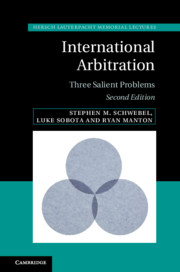Book contents
- International Arbitration: Three Salient Problems
- Recent Books in the Hersch Lauterpacht Memorial Lecture Series
- International Arbitration
- Copyright page
- Contents
- Preface to the Second Edition
- Cases
- I The Severability of the Arbitration Agreement
- II Denial of Justice, and Other Breaches of International Law, by Governmental Negation of Arbitration
- III The Authority of Truncated International Arbitral Tribunals
- Index
II - Denial of Justice, and Other Breaches of International Law, by Governmental Negation of Arbitration
Published online by Cambridge University Press: 09 January 2020
- International Arbitration: Three Salient Problems
- Recent Books in the Hersch Lauterpacht Memorial Lecture Series
- International Arbitration
- Copyright page
- Contents
- Preface to the Second Edition
- Cases
- I The Severability of the Arbitration Agreement
- II Denial of Justice, and Other Breaches of International Law, by Governmental Negation of Arbitration
- III The Authority of Truncated International Arbitral Tribunals
- Index
Summary
One of the most striking features of arbitral practice over the past three decades has been how old problems have continued to arise in new guises. This is particularly apparent with the problem of States’ various attempts to negate arbitration, and whether denial of justice may be invoked to confront that practice. This issue is considered in the second chapter of this book. The practice since the time of the first edition of this book underscores that governmental evasion and negation of arbitration can take a number of forms. Arbitral tribunals, and in particular those constituted under bilateral investment treaties, have responded to new attempts at governmental negation of arbitration. The question today is not only whether a State’s refusal to arbitrate may constitute a denial of justice, but whether a State’s attempt to negate arbitration—by, for example, improperly setting aside an international award—may constitute a compensable expropriation of property rights, a breach of fair and equitable treatment, or another breach of an investment treaty.
- Type
- Chapter
- Information
- International ArbitrationThree Salient Problems, pp. 65 - 151Publisher: Cambridge University PressPrint publication year: 2020

